During the second round of mayoral election on 15 November, official observers of Civil Network OPORA monitored electoral procedures at polling stations chosen by a representative sampling in 29 cities of Ukraine. In Dnipropetrovsk, OPORA organized the parallel vote tabulation at 100% of polling stations.
According to the observation results, OPORA has concluded the following:
- Election law violations, detected during the second round of mayoral elections in 29 cities, were not wide-scale, systematic or centralized.
OPORA has estimated that violations detected at polling stations couldn't influence final results of the second round election. The number of violations committed by election commissions and other electoral subjects during the second round has decreased in comparison to the voting process on 25 October 2015.
However, there were some incidents and events that could be classified as gross violations, and should be investigated by law-enforcement in an operative and unbiased manner.
- According to the data gathered by OPORA, activeness of the voters on 15 November was lower that on 25 October (34.4% and 46.6% respectively). Thus, approximately 12% less voters less participated in the second round of voting if compared to the regular local elections held on 25 October 2015.
Lower voter turnout in the second round displays the specifics and intensity of the second round in the certain territorial communities and cannot be interpreted as decreased public legitimacy of the elections or public trust to the institution of elections. Ukrainian government haven't secured stability of the election legislation, what could affect citizen awareness of the electoral system used for mayoral elections and the second round in particular.
- Introduction of the absolute majority electoral system for election of city mayors (in big cities having over 90 thousand voters) helped the voters to fully access their attitude to two top candidates in their territorial communities, what increases responsibility of all parties for final election results.
However, not all the candidates have used these opportunities fully, and neither participated in direct debates with competitors, nor organized any campaigning events besides mass media advertising.
- Despite precinct election commissions had been formed shortly before the 15 November, the voting process was organized without considerable organizational and procedural complications, and the proper voting conditions were secured.
- There were some instances when members of city, raion, city and precinct election commissions were substituted on the eve of the second round election. Such late substitutions cannot be considered as acceptable and hinder stability of the corresponding collegial bodies.
Another issue is non-transparent distribution of political influence in election commissions, which occurs when some local party cells use their quotas for the benefit of other electoral subjects.
- The conflict between the head, secretary and most of Dnipropetrovsk Election Commission members concerning rotations of raion in city and precinct commission members on the second-round election day had seriously hazarded the legitimacy of the election process in general. In particular, OPORA's observers noticed that some individuals were working as members of precinct election commissions despite their authority wasn't approved in a proper way due to the conflict in city election commission. This situation has also affected the quorum at the certain PEC meetings.
OPORA would like to state that the CEC should have taken a decision within its authority goaled to stabilize the functioning of Dnipropetrovsk Election Commission and avoid legal collisions related to its functioning as well as the functioning of raion-in-city and precinct election commissions. However, according to OPORA's assessment, the CEC hasn't influenced the situation enough.
- As for the most resonant electoral violations detected on the second round election day, the following violations should be mentioned: ballots were issued to individuals who are not included in the voter list at polling station #321130 (city of Bila Tserkva, Kyiv oblast); some individuals with unofficial voter lists were trying to detect whether the voters included in these lists have participated in the election process or not (Zaporizhia[1] and Kyiv[2]); some unidentified persons organized an event in Dnipropetrovsk aimed to engage the voters and used leaflets containing personal data of the citizens and hidden advertising for the certain candidates[3]; some voters registered at two polling stations in Dnipropetrovsk didn't receive the ballots because, apparently, their signatures were forged in the voter list[4]. Law enforcement bodies should respond to these and other similar incidents. Besides that, they should secure proper investigation of incidents when activities of official observers were hindered. For example, gross violation concerning the rights of OPORA's observers which were reported in Kyiv and Dnipropetrovsk
- The voting was held on the regular pace without considerable violations or conflicts and in accordance with the procedures established by the Law. If compared to the first round, the number of violations detected by OPORA's observers has significantly decreased, particularly attempts to issue ballots without passport verification – from 17.8% to 0.8% in Ukraine. Besides that, we are concerned about incidents related to violation of the voting secrecy, percentage of which has increased from 7.5% to 9.2% in Ukraine if compared to the first round. Taking pictures of ballots remains quite widespread violation, detected at 11.7% of polling stations in Dnipropetrovsk (12.1% in the first round). Observers didn't notice any no pre-planned or systematic violations of electoral legislation.
Typical violations, detected during the voting process and vote count
OPORA's observers have been watching the voting process and activities of election commission for the whole election day on 15 November. OPORA secured comprehensive monitoring and reporting about violations noticed on the preparatory meetings of precinct election commissions and opening of polling stations, during the voting process, vote count in PECs and transference of documentation to DECs. All the violations that were detected by OPORA's observers were generalized and classified in order to assess the scale of violations and level of illegal influence on the election process. Statistically based observation covered all 29 cities where the second round of voting was held. The city of Dnipropetrovsk, for its part, was covered 100%.
The voting was held on the regular pace without considerable violations or conflicts and in accordance with the procedures established by the Law. Observers didn't notice any no pre-planned or systematic violations of electoral legislation. The number of violations has significantly decreased if compared to 25 October 2015.
Minor violations which concern violation of the voting procedure were detected at 17% of polling stations in Ukraine. On 25 October, such incidents occurred more often – at 24.5% of polling stations. The number of detected violations has decreased in Dnipropetrovsk from 40% to 21.4% of polling stations if compared to the first round.
According to OPORA's observers, 11.5% of precinct election commissions started their preparatory meetings earlier than 7:15 a.m. on 15 November 2015. To compare, 17% of polling stations started preparatory meetings earlier in the first round. Only 9% polling stations in Dnipropetrovsk started preparatory meetings earlier than the time established by the Law, while this percentage on 25 October reached 12.4%. According to the Law of Ukraine on Local Elections, PECs must hold their preparatory meetings not earlier than 45 minutes before the voting begins.
All the precinct election commissions in the country conducted preparatory meetings, and gathered quorum (more than half of total commission membership). At the same time, 2% of election commissions of Dnipropetrovsk didn't keep the minutes of their preparatory meetings. It's much less if compared to 25 October, when morning meeting minutes were not kept at 8% of polling stations in Dnipropetrovsk. Morning meeting minutes were not kept at 7% precinct election commissions, what is equal to the first round percentage. There were only some incidents when PEC stamps were absent or disappeared, the seals on safes with ballots were damaged, or there was a shortage of ballots at polling stations.
Besides that, according to OPORA's data, the number of polling stations which have opened on time (at 8:00 AM) has increased to 92%. On 25 October, only 85% of polling stations have started the voting process in accordance with the law (not earlier and not later than 8:00 AM). In Dnipropetrovsk, however, the percentage of polling stations which have opened on time is slightly less than throughout Ukraine – 88%.
Similarly to the first round, only a little more than 1% of OPORA's observers have reported that precinct election commissions failed to provide them with opportunity to conduct a comprehensive observation of all election procedures on morning meetings and the beginning of voting process.
Violation of the voting secrecy was the most frequent violation detected by OPORA's observers, particularly when choice of a voter was intentionally disclosed. Such incidents were detected at 9.2% polling stations in Ukraine. To compare, such violations were detected only at 7.5% of polling stations in the first round. In Dnipropetrovsk, however, the percentage of voting secrecy violation incidents has decreased from 13.8% to 8.9%.
Similarly to the first round, incidents when voters took pictures of their ballots occurred here and there in Ukraine. However, in Dnipropetrovsk, the percentage of polling stations where such violations occurred was higher than at national level - at 11.7% of polling stations (12.1% in the first round). Taking pictures of ballot papers was, however, occured the most often, according to OPORA's observers watching the 15 November election day in Dnipropetrovsk.
Violations, which occurred the most often on 25 October, became rare in the second round. In particular, these were attempts to issue (or receive) ballot papers without passport verification. The percentage of such incidents has decreased from 17.8% to 0.8% in Ukraine. Such tendency could be explained by the fact that such incidents usually occur in villages, and these elections didn't cover rural areas.
Fortunately, OPORA's observers haven't noticed any incidents when the voters were banned from entering polling places.
In contrast to the first round of voting, observers haven't reported that election commissions hindered or limited their activities and, as a result, they couldn't observe all the election procedures.
Voter turnout on the second round of voting (calculated by the OPORA)
Under the observation campaign, Civil Network OPORA conducted the parallel turnout tabulation. We collected the data as of 12:00 PM, 4:00 PM and 8:00 PM from polling stations where official observers of Civil Network OPORA were deployed in accordance with the representative sampling at nationwide level and in Dnipropetrovsk. In Dnipropetrovsk, OPORA's observers were deployed to each polling station and calculated the voter turnout there.
Thus, the nationwide voter turnout on 15 November was 34% as of 8 PM (margin of error ±1.1%). It should be mentioned that the turnout was higher in 12.6% on 25 October – 46.6% (margin of error ±1.1%).
Besides that, voter turnout in Dnipropetrovsk has slightly increased in the second round from 43.6% to 45%. The voter turnout in Dnipropetrovsk is higher than at national level. In the first round, however, the voter turnout in Dnipropetrovsk was slightly lower than national turnout.
| Region | Turnout as of 12:00 PM | Turnout as of 4:00 PM | Turnout as of 8:00 PM |
| In Ukraine (first round) | 18.5 % | 36 % | 46.6 % |
| In Ukraine (second round) | 12.8% | 26.4% | 34% |
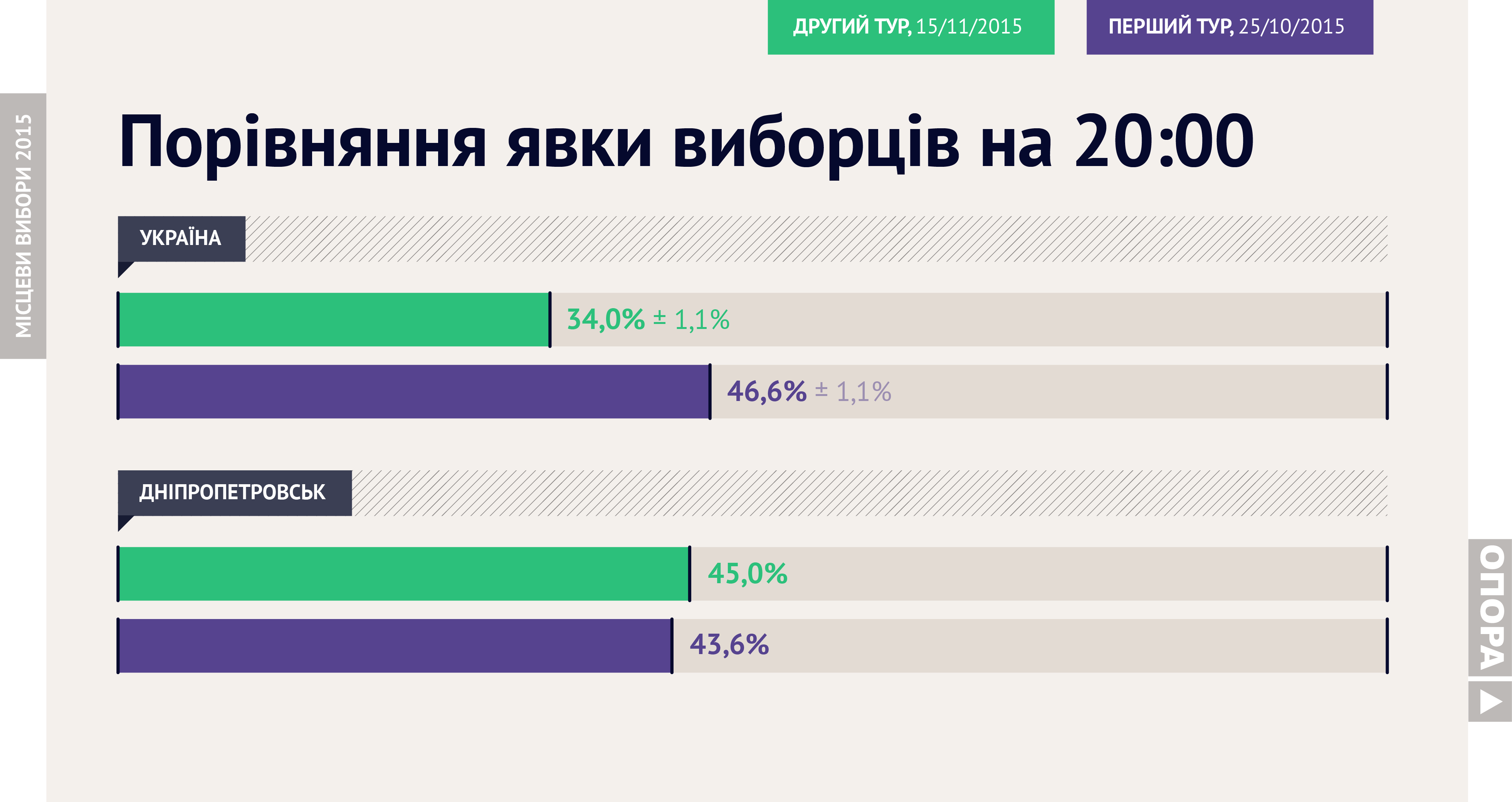
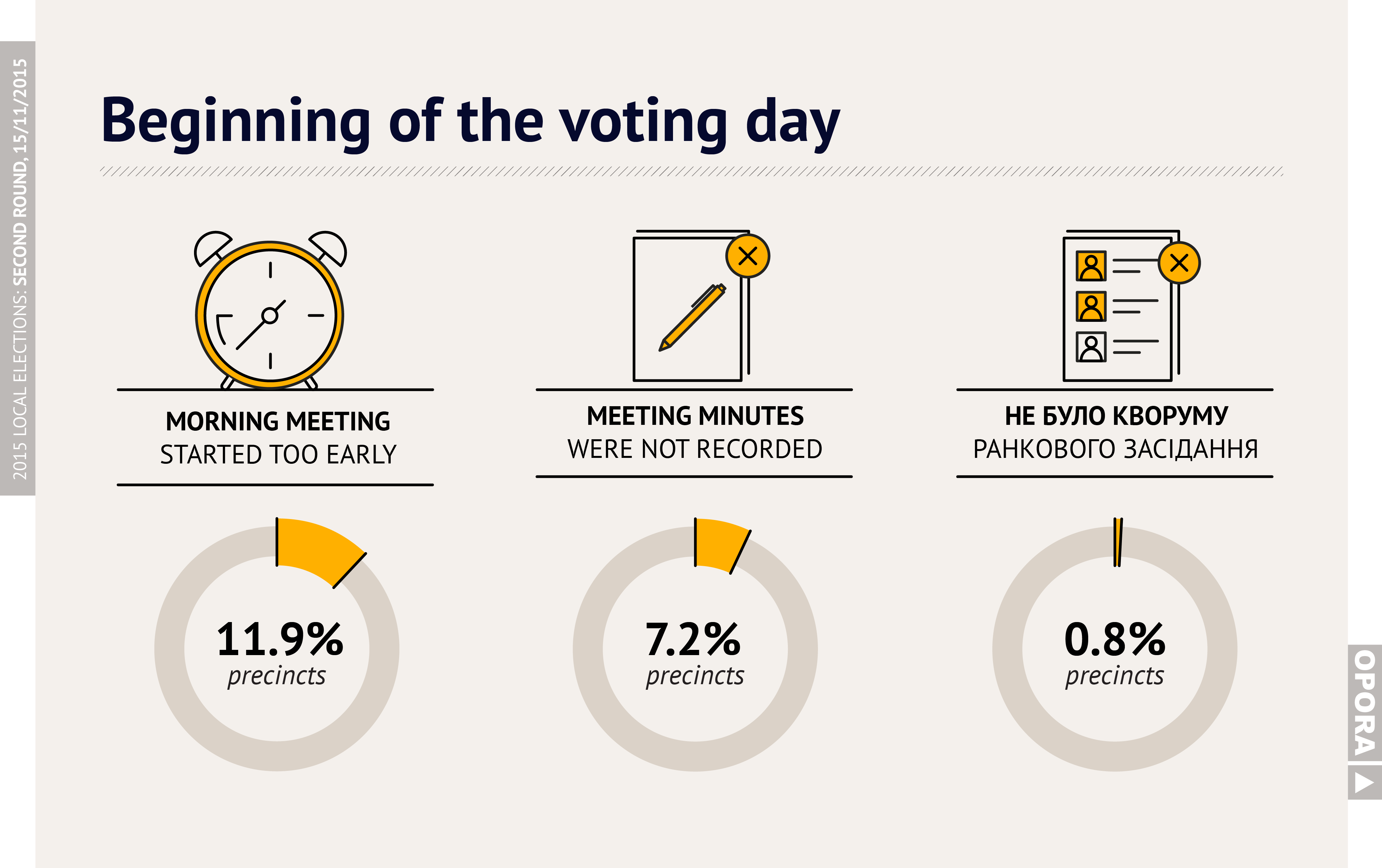
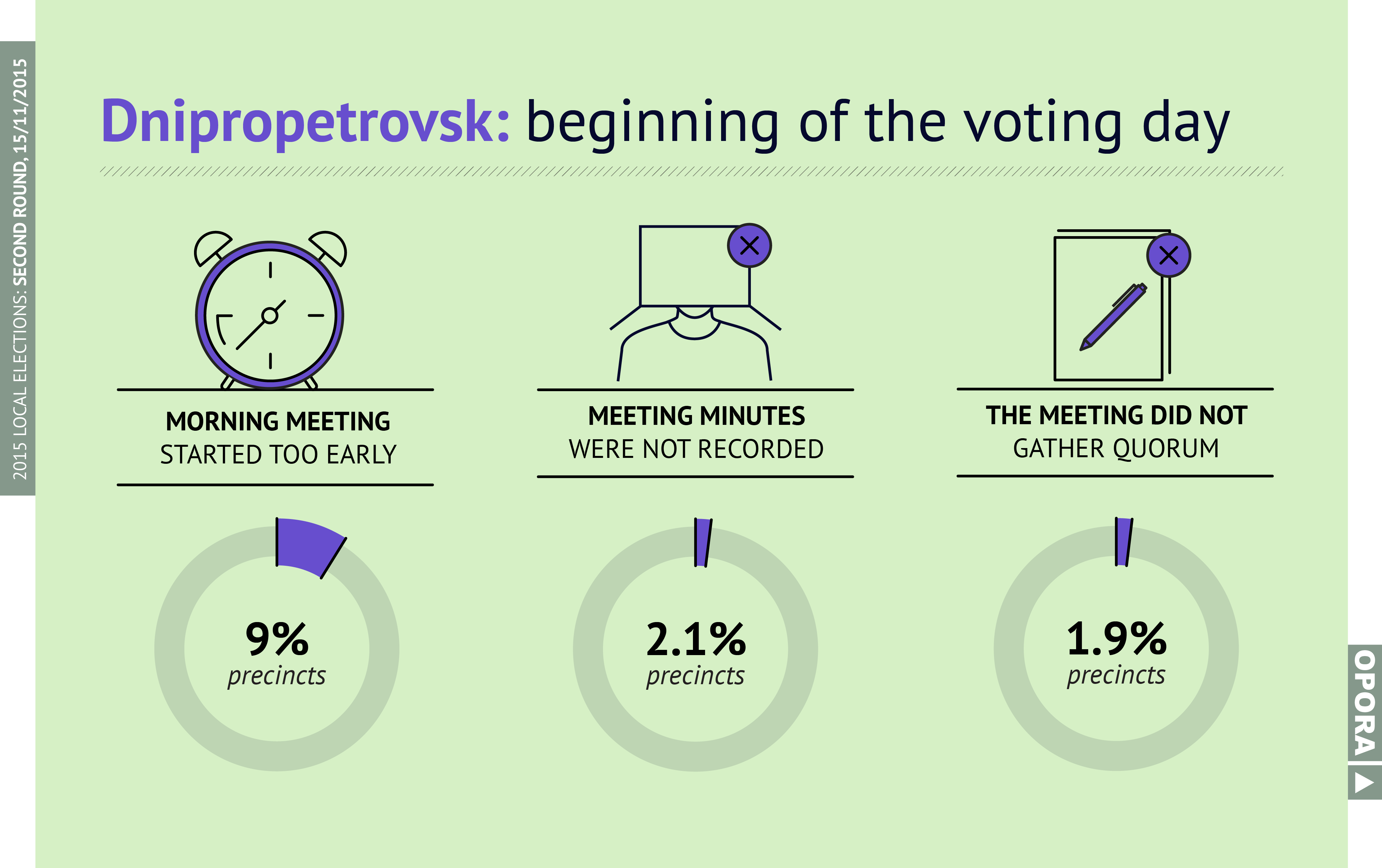
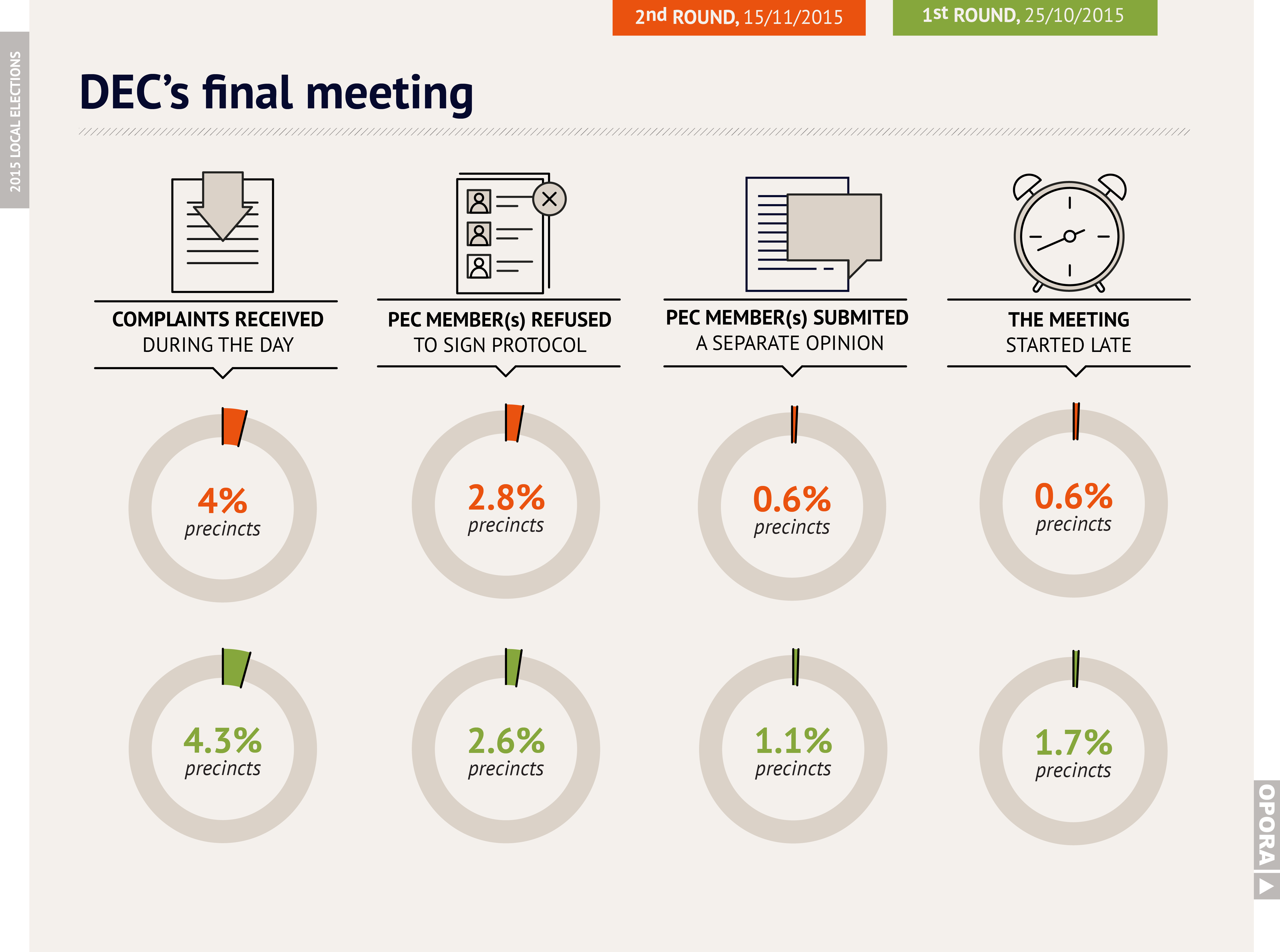
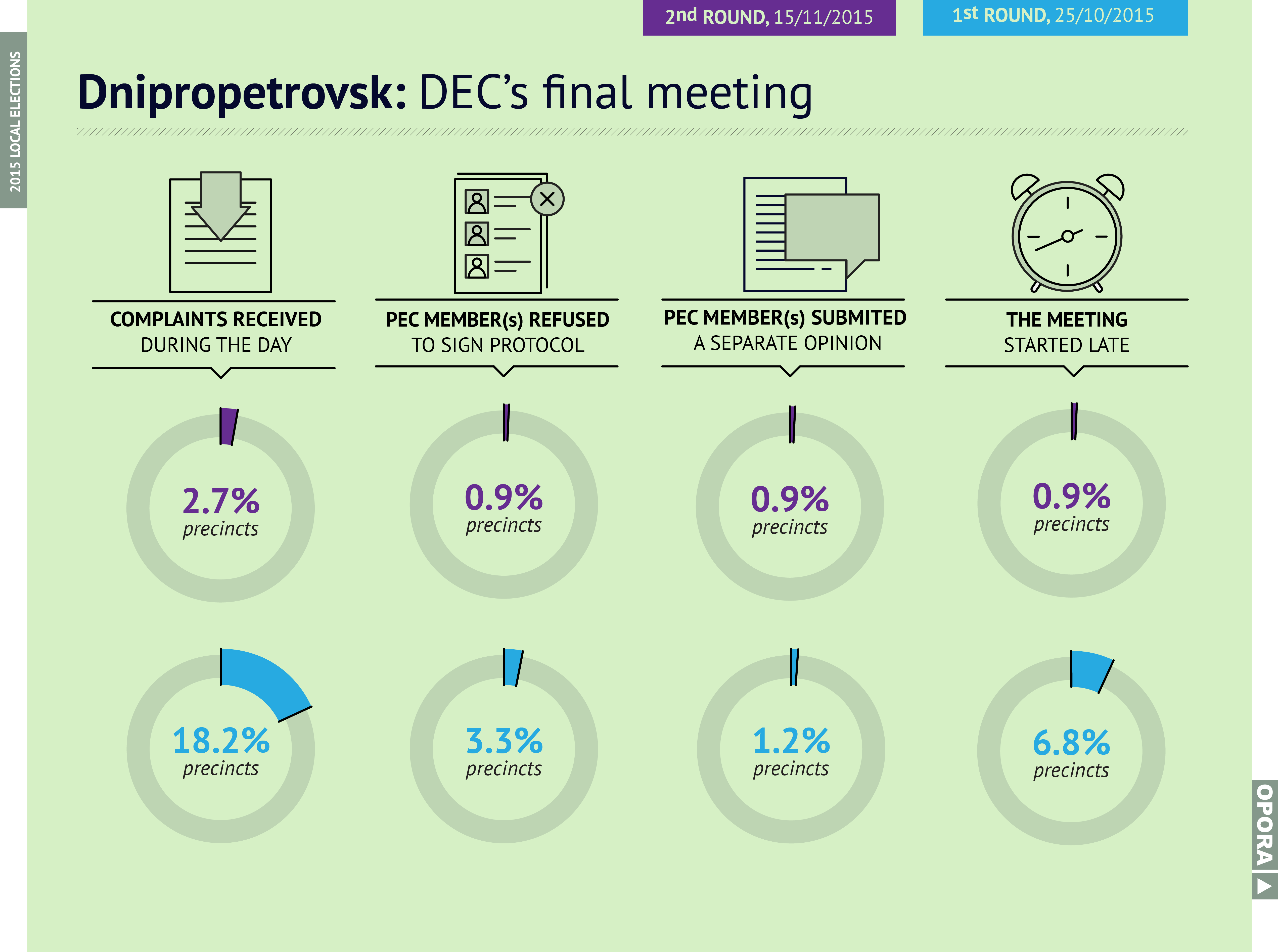
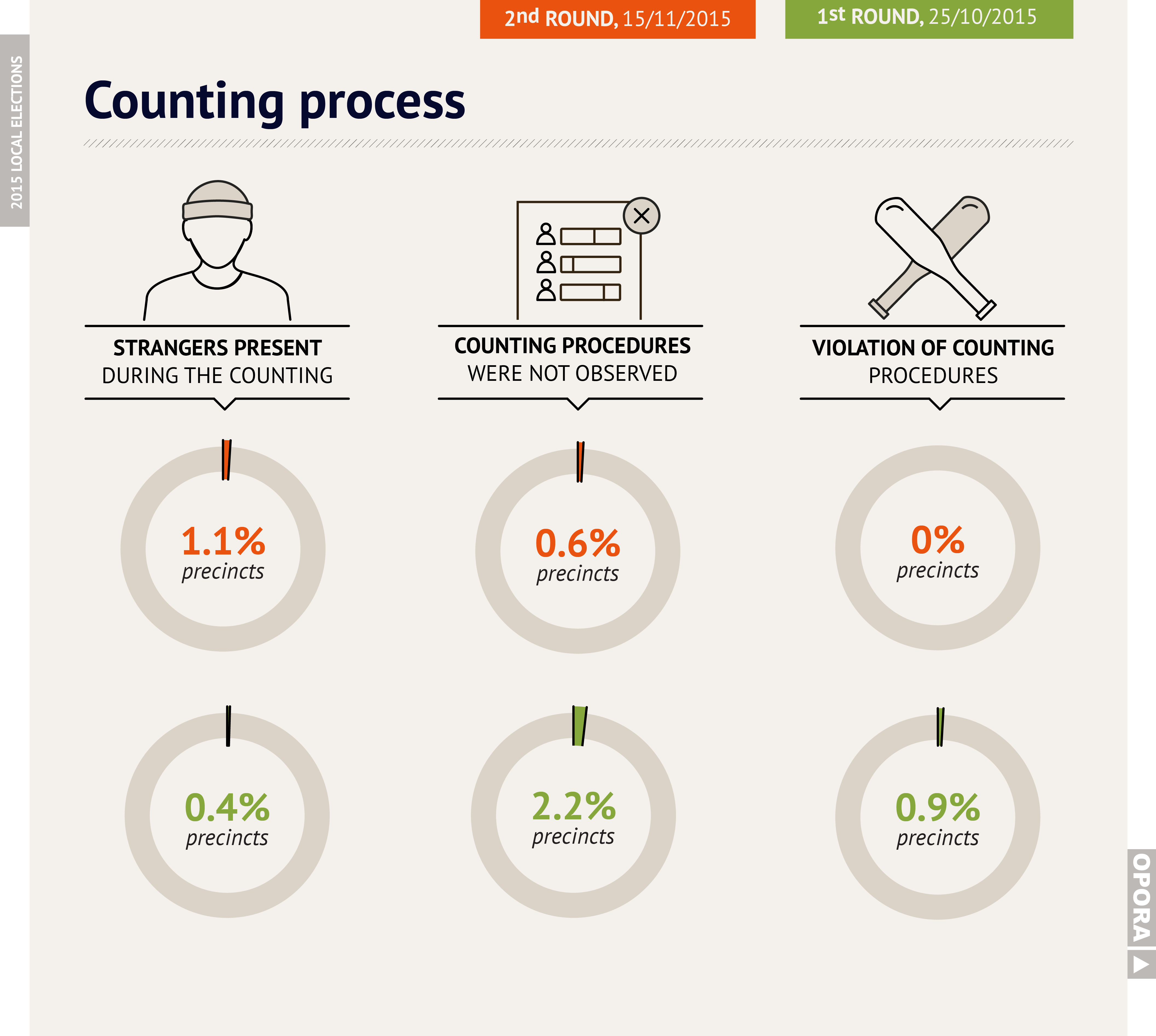
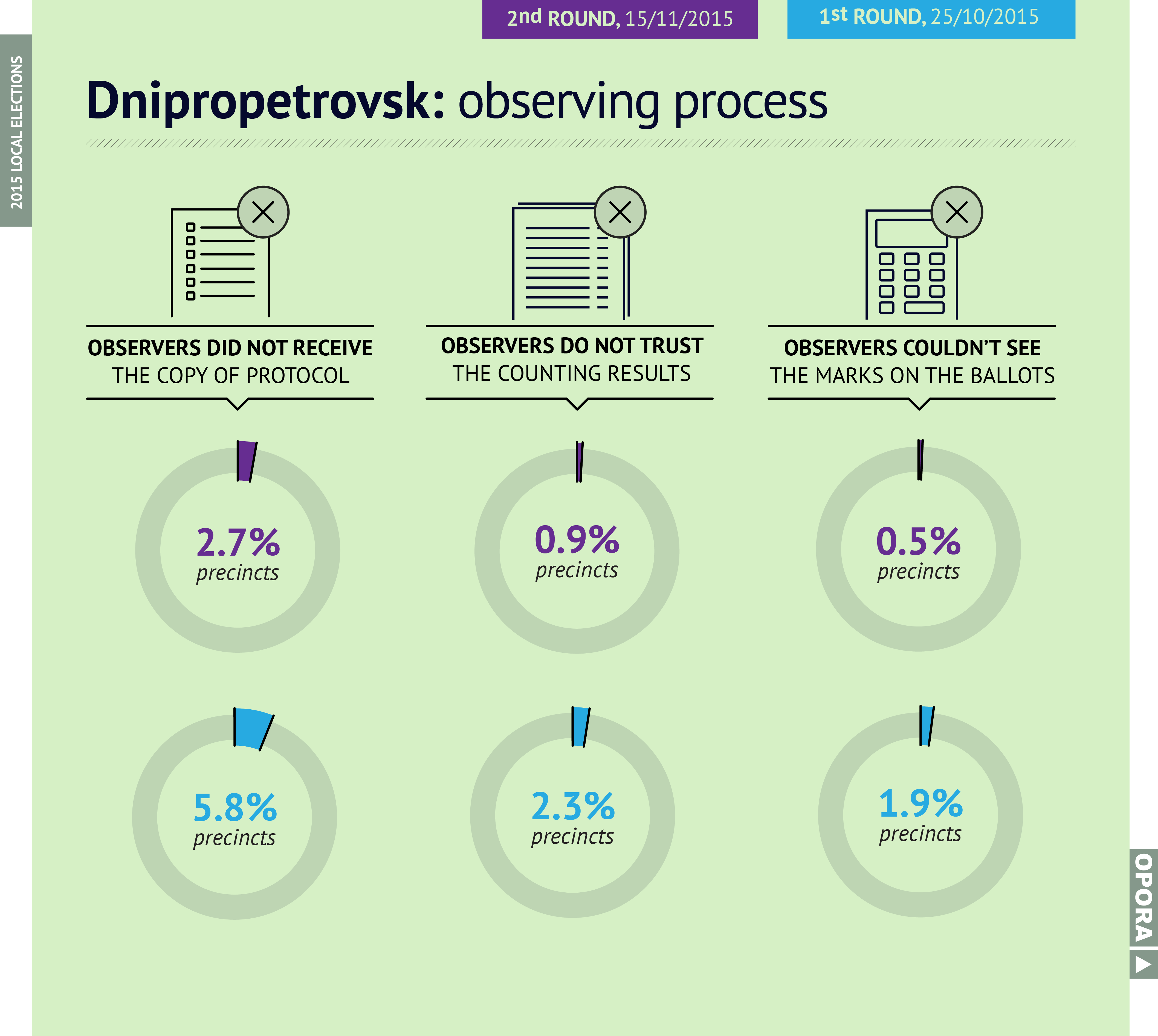
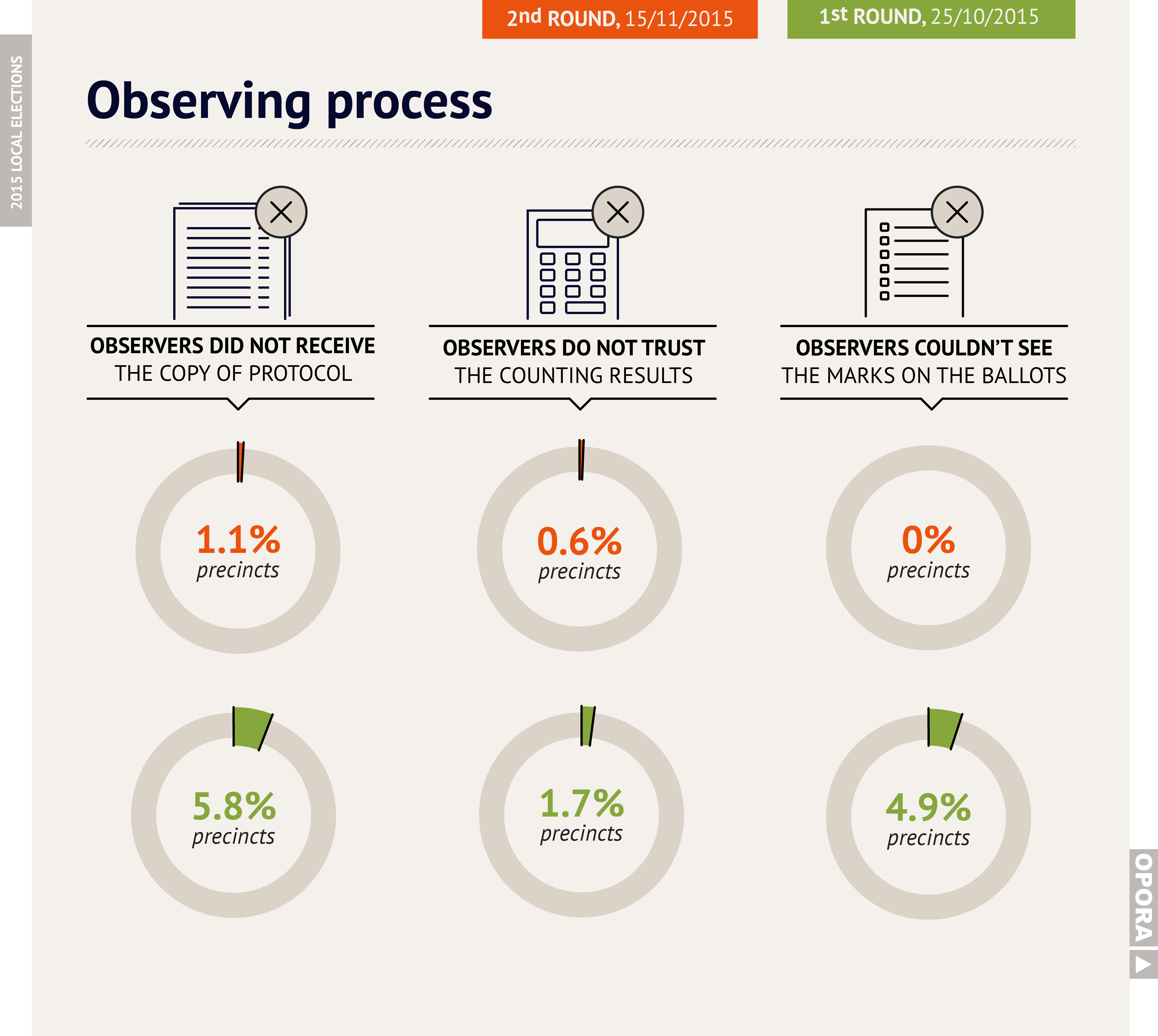

[1] http://www.oporaua.org/novyny/41532-v-zaporizhzhi-zhurnalisti-kontrolyuyut-yavku-na-viborakh-i-reestruyut-sya-zavtrashnim-chislom
[2]http://www.oporaua.org/novyny/41548-u-kyievi-opora-fiksuie-sproby-sposterihachiv-vid-nablyzhenoi-do-klychka-nho-prokontroliuvaty-iavku
[3]http://www.oporaua.org/novyny/41547-v-den-holosuvannia-v-mdnipropetrovsk-opora-zafiksuvala-aktyvnist-nevidomoi-hromadskoi-initsiatyvy-pidozra-u-porushenni-zakonodavstva
[4]http://www.oporaua.org/novyny/41613-na-dvokh-dilnytsiakh-u-dnipropetrovsku-vybortsi-ne-zmohly-proholosuvaty-cherez-chuzhyi-pidpys-naproty-ikh-prizvyshch-u-spysku